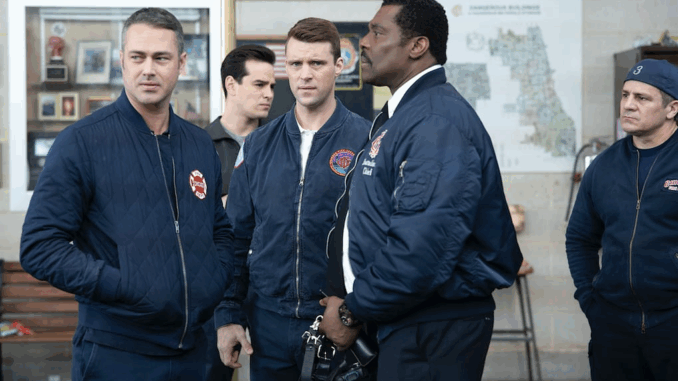
In the heart-pounding world of Chicago Fire, few characters embody the show’s soul more than Christopher Herrmann. For over a decade, fans have watched him navigate the ups and downs of life at Firehouse 51, from his financial struggles to his well-earned rise to a position of leadership. In the Season 13 finale, Herrmann faced his biggest dilemma yet, making a noble sacrifice that has left him with a palpable sense of regret. While some might point to other characters as the source of his pain, a deeper analysis reveals that the real culprit behind Herrmann’s difficult choice is none other than the man who just left: Chief Wallace Boden.
While the finale was a moment of triumph for Herrmann and his friend Mouch, it was also a direct consequence of a decision made by Boden. By examining the context of Boden’s departure, we can see that his actions, however well-intentioned, set off a chain reaction that forced Herrmann into an impossible position.
The Dilemma: Herrmann’s Ultimate Sacrifice
The central plot point of the Season 13 finale was the much-anticipated changing of the guard at Firehouse 51. With Chief Boden’s sudden decision to leave for a new role at OFI, a new leader was needed. Herrmann, having finally passed the lieutenant’s exam, was a prime candidate for the position. He had worked his entire career for this moment, and he was ready to lead.
However, in a move that was both an act of profound selflessness and a crushing blow to his own ambition, Herrmann stepped down from the role to allow his best friend, Randy “Mouch” McHolland, to be promoted. He made this sacrifice because he knew how much Mouch deserved the position and that it was his last chance. While this was a testament to Herrmann’s character, it was also an act that has left him grappling with a deep sense of loss. He sacrificed not only his dream but also a significant portion of his salary, a decision that will have a lasting impact on his family.
The Case Against Boden
While Herrmann’s choice was ultimately his own, the circumstances that led to it were directly created by Boden. Here are the reasons why Boden, not some outside force, is to blame for Herrmann’s dilemma.
1. The Timing and Nature of the Departure
Chief Boden’s exit was sudden and shrouded in secrecy. He accepted the new position and left the firehouse without a clear line of succession in place. Had he announced his departure earlier, he could have worked with the leadership at Firehouse 51 to ensure a smooth transition. Instead, his abrupt exit created a power vacuum and a sense of chaos, forcing the remaining members of the firehouse to make difficult, last-minute decisions. This lack of planning and communication by the firehouse’s leader put Herrmann in an impossible position.
2. A Legacy of Unspoken Expectations
For over a decade, Boden was more than just a chief; he was a father figure and a moral compass. He preached a philosophy of selflessness, putting the team before oneself, and doing what’s right, even if it’s hard. Herrmann, a deeply loyal and moral character, took these lessons to heart. By making his sacrifice for Mouch, Herrmann was, in essence, living up to the very standard that Boden had set for him. He was a product of Boden’s teachings, and in this one instance, that teaching led him to give up his own happiness for the good of his friend.
3. The Lack of A Clear Succession Plan
The most compelling argument against Boden is his failure to create a clear succession plan. While he hand-picked Stella Kidd for the role of his replacement, he did not account for the fact that Kidd had her own plans. If Boden had simply created a clear path forward for the lieutenancy, Herrmann would not have been forced to choose between his ambition and his loyalty to his friend. Instead, Boden’s exit left the firehouse in a state of flux, and it was that chaos that forced Herrmann to make a decision he may have never had to make otherwise.
The Aftermath: A New Kind of Leadership
The consequences of these decisions will be a central theme of the upcoming season. Herrmann, who is now grappling with the consequences of his sacrifice, will have to figure out his new role in the firehouse. He will have to learn to take orders from Mouch, a man who has always been his peer. His journey will be one of a leader without a title, a mentor without an official rank.
Meanwhile, the firehouse will have to adapt to a world without Boden as its patriarch. The new leadership, whether it’s Kidd, Mouch, or someone else, will have a difficult time filling his shoes. The firehouse will be tested, and its sense of family will be challenged.
In the end, while Herrmann’s choice was his own, it was a choice made in a vacuum created by Boden. The beloved chief’s departure was not a clean break; it was a decision that had a domino effect on the lives of everyone at Firehouse 51. By “blaming” Boden, we are not diminishing Herrmann’s sacrifice. Instead, we are acknowledging the complex legacy of a great leader and the profound impact his choices had on the lives of those he left behind. The upcoming season will not only be about Herrmann’s regret but also about the enduring, and sometimes difficult, legacy of Chief Boden.